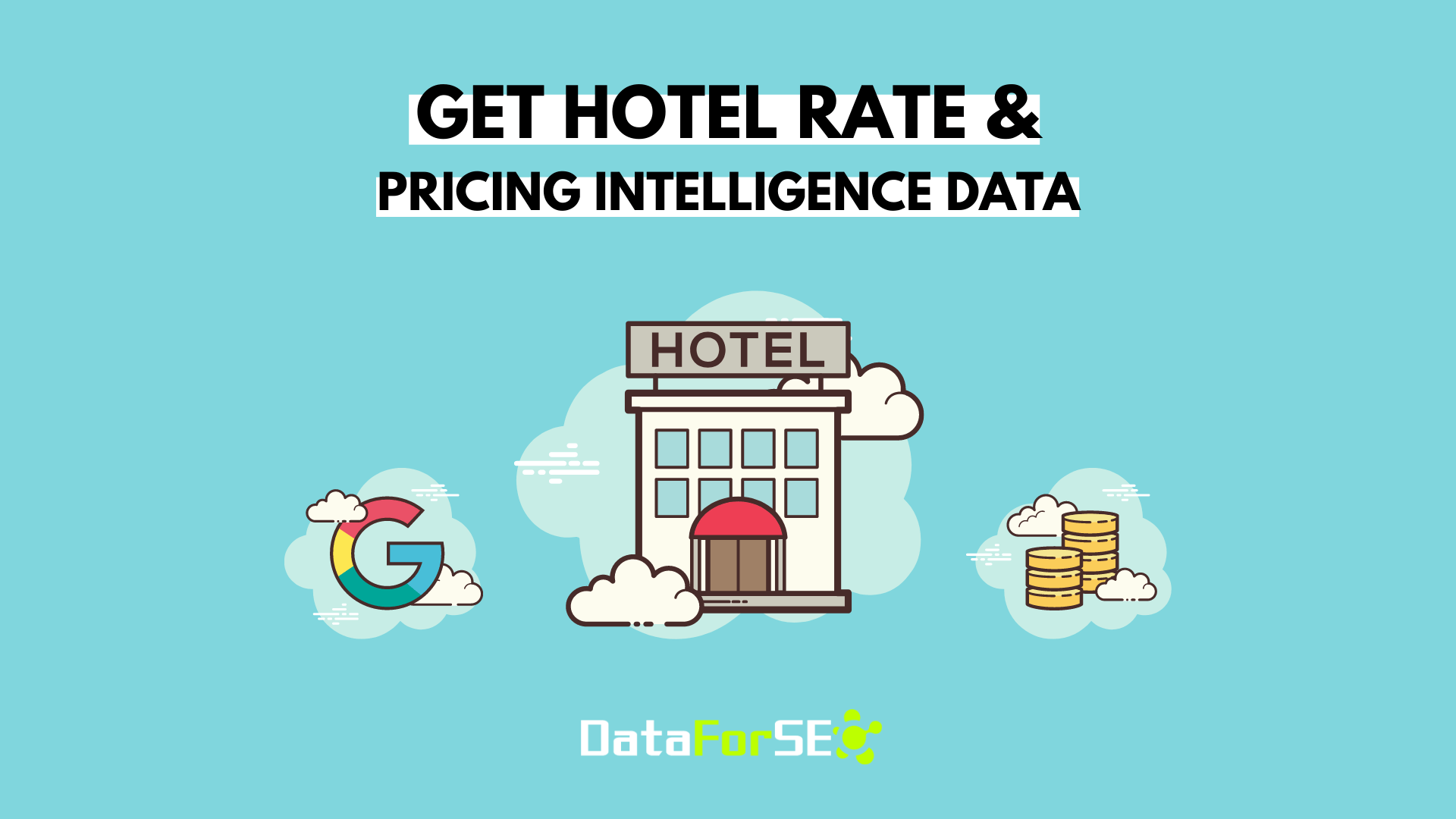
Get Hotel Rate & Pricing Data from Google with API by DataForSEO
Differentiating in the hotel industry is often tough, especially for budget accommodations that mainly target price-sensitive clientele. As a rule, the major leverage to increase demand for a place is lowering its booking price.
Most accommodation providers are keeping competition-based pricing at the forefront of their revenue management strategies. However, competitor rate monitoring in the hospitality industry is rather complex.
The thing is, hoteliers employ a great diversity of channels for maximizing their place’s visibility, bookings, and revenue. When your hotel is listed on some dozen OTAs (e.g. Booking.com, Hostelworld) and metasearch engines (e.g. Trivago, TripAdvisor), it’s almost impossible to keep your finger on the pulse of the industry without a proper automation solution.
In this article, we’ll walk you through the following points:
. How Google Hotels data can empower competitive analytics
. What makes an efficient pricing intelligence tool
. How to build one hassle-free with DataForSEO Google Hotels API
How Google Hotels data can empower competitive analytics
Google is monopolizing the travel industry. First, there were Google Maps and Google Flights, then Google jumped on the bandwagon with Hotel Search.
It’s now the starting point for millions of people all over the world who are planning a trip and looking for hotels or places to stay. From the hoteliers’ standpoint, Google Hotel Search offers ample opportunities to reach potential visitors.
At the same time, being an aggregator of data on accommodations from a variety of sources (e.g. brand website, Booking.com, TripAdvisor, Expedia), Google Hotel Search also opens up immense possibilities for competitive analysis.
Let’s take a look at how Google Hotel Search works and what data it provides.
For such queries as “cheap hotel in vienna”, Google Search displays a “hotel pack” feature.
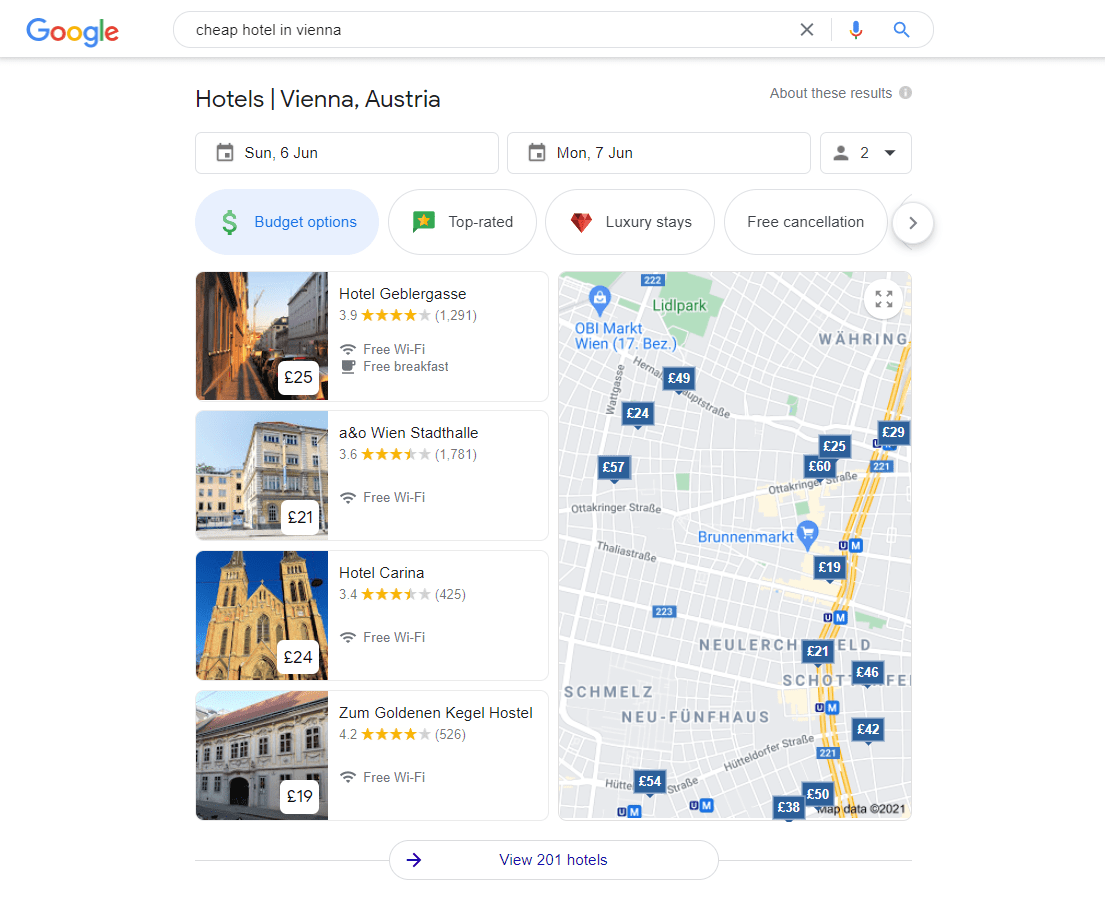
The “view…” button from here will send you to the “immersive view” of Hotel Search. It provides organic and paid hotel listings with their names, photos, prices, and ratings, as well as a map with hotel location pins featuring their booking rates.
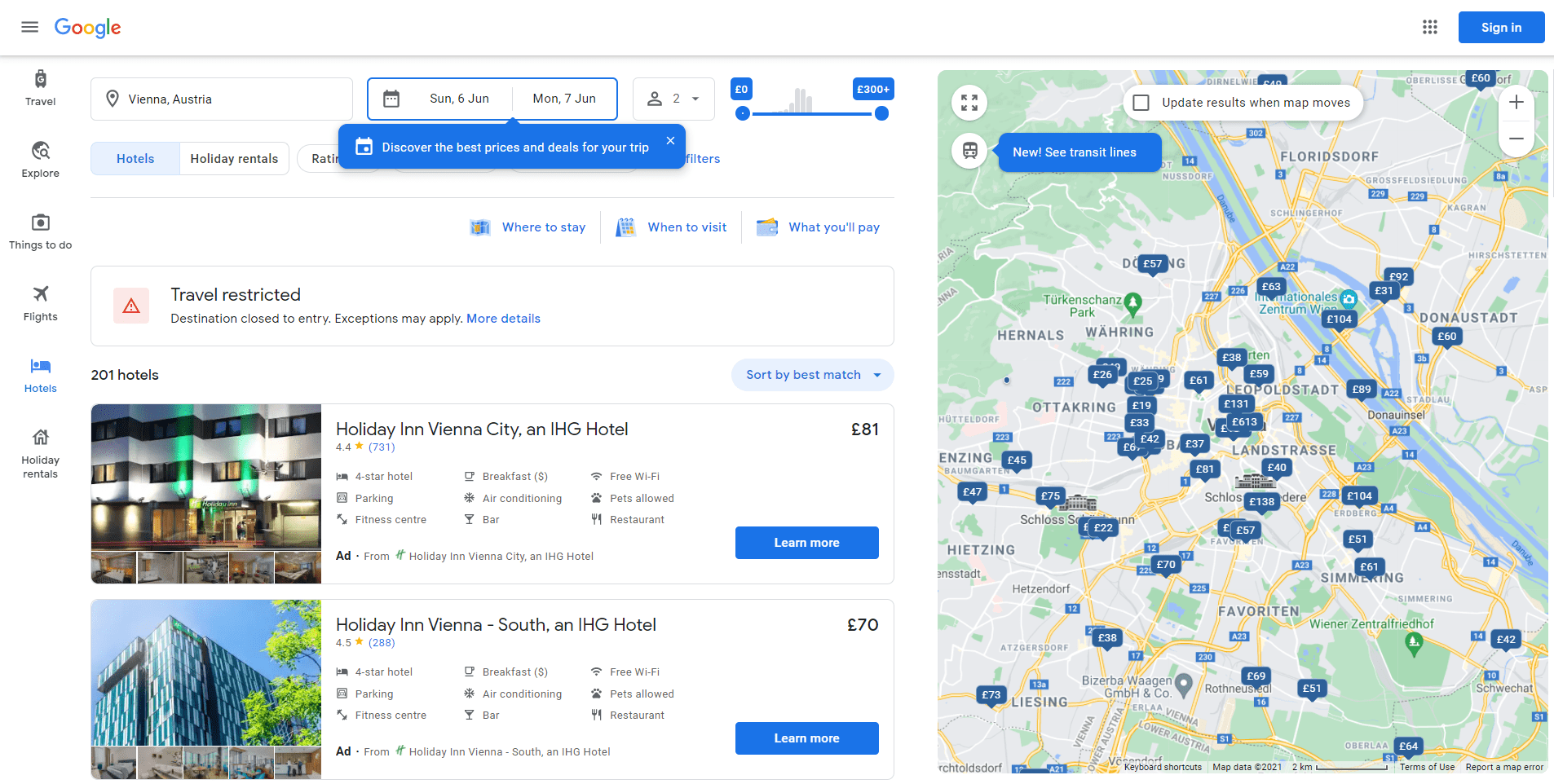
Clicking on any hotel will take the searcher to the “hotel placesheet” with the property’s contact details, amenities, user reviews, and booking prices on different websites.
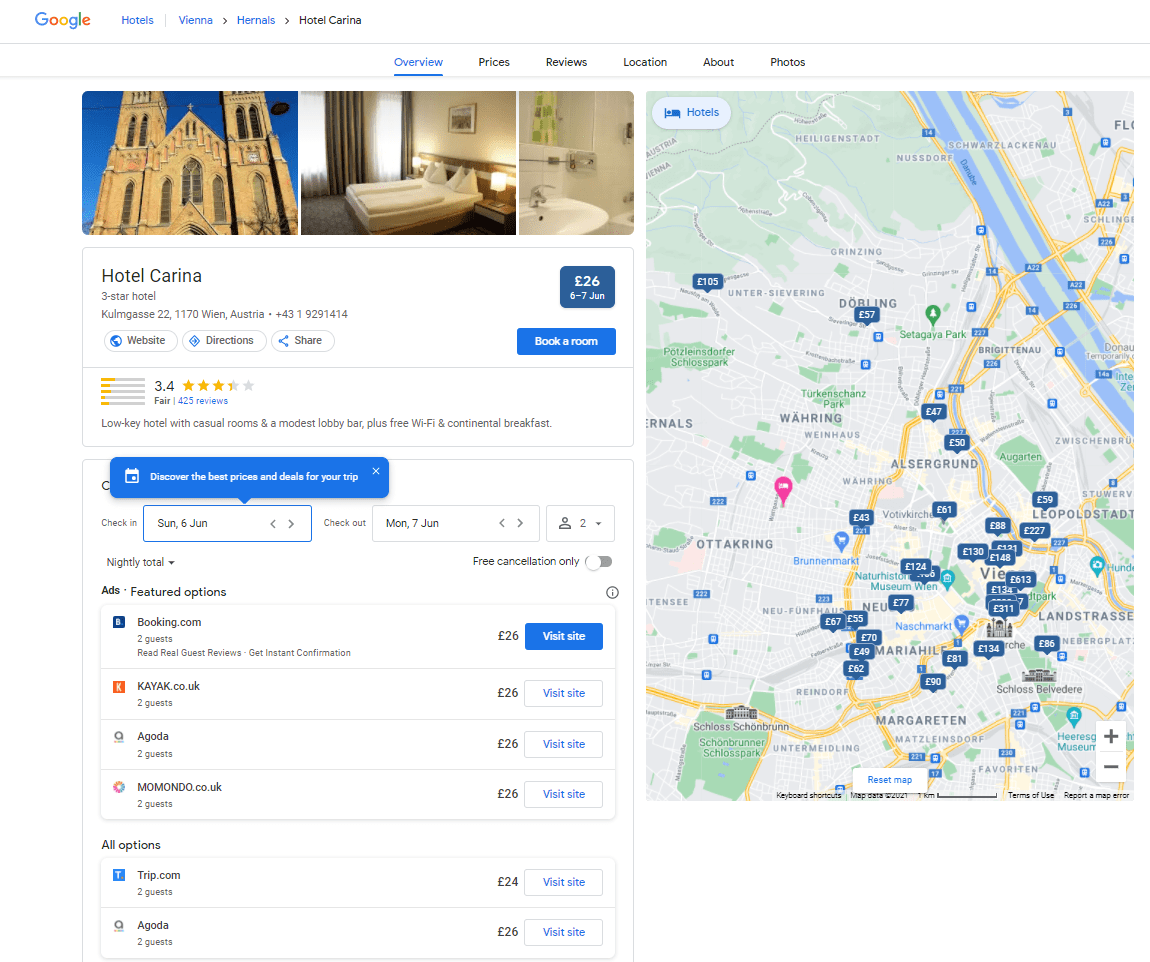
Not so long ago, all links to book a room in a hotel were listed on a paid basis. Starting from March 2021, Google added an opportunity to list free booking links on Hotel Search. Now you’ll find an “Ads” badge with paid listings under it, and “All options” with free booking links.
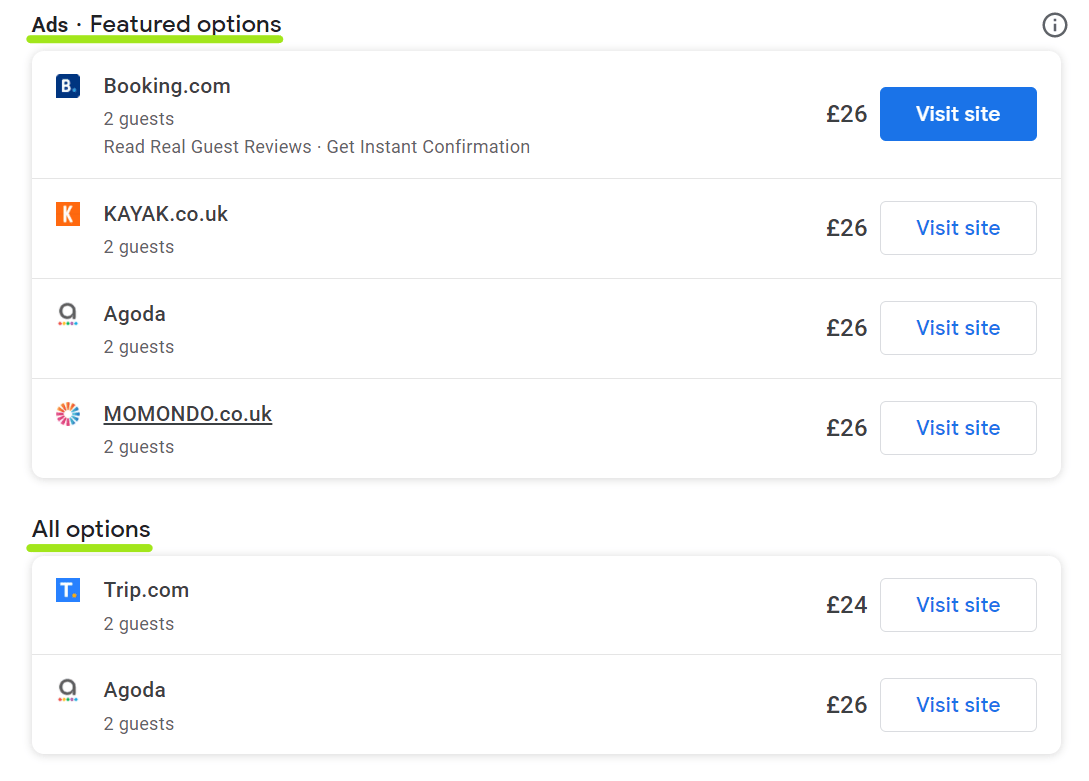
As you can see, Google Hotel Search conveniently provides a comprehensive overview of any hotel’s pricing from a variety of OTAs and metasearch engines in one place. A combination of this data for multiple hotels can help to gain a deep understanding of the existing demand, competitor room availability, and rates on different channels.
That is why aggregation of such data points from Google Hotel Search provides incredible value when it comes to building solutions for competitive set analysis and price monitoring.
What makes an efficient pricing intelligence tool
Pricing intelligence tools play a key role in hotel management. They help hoteliers to keep track of their competitor pricing strategies and timely optimize rates of their property’s rooms to increase revenue.
To put it briefly, the software automatically tracks supply and demand changes in the market based on competitor prices and room availability and alerts users when they need to make changes to their rates.
Diving into more details, efficient pricing & rate intelligence tool should have the following functionality:
Unified dashboard containing competitor rates comparison with a possibility to toggle between different room types, length of stay, and other parameters. It allows to track and quickly assess competitor rates on various channels to make sure the property won’t lose visitors due to excessive rates and won’t lose revenue opportunities when demand escalates.
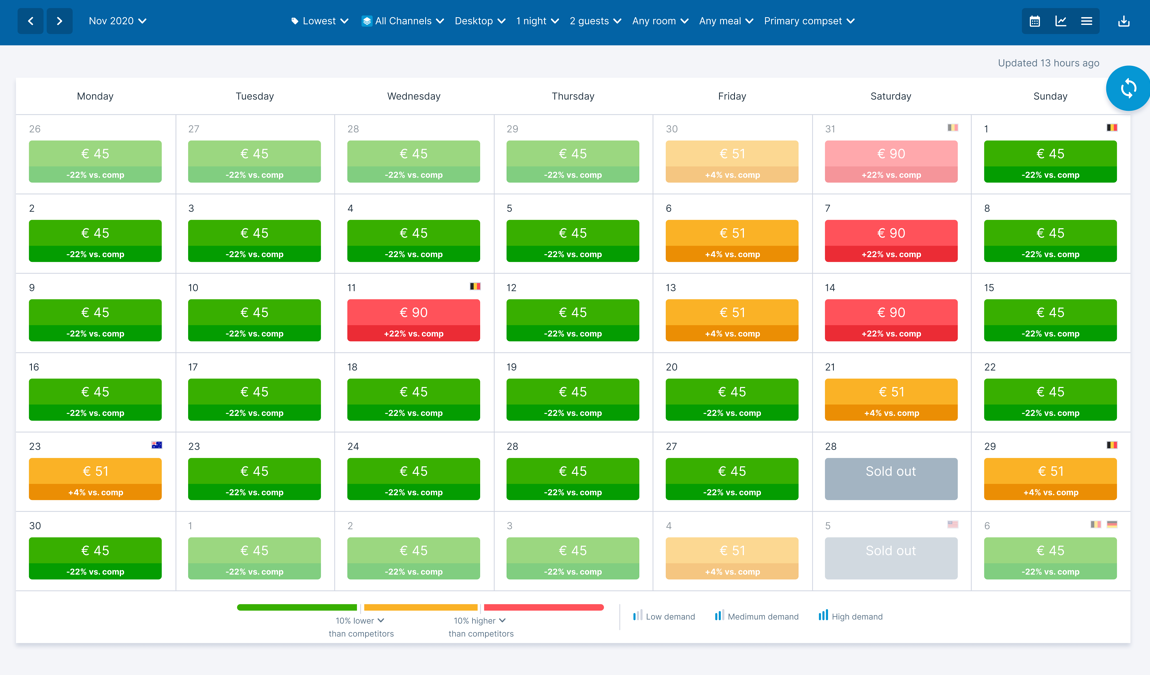
Historical data of competitor prices. This view provides great insights into the compset’s pricing patterns based on their rate fluctuations from different channels. Empowered with this data, hoteliers can improve their future pricing strategies accordingly.
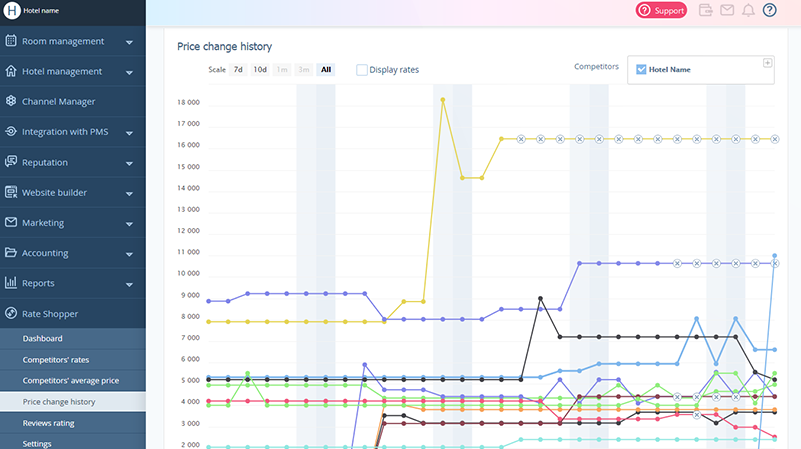
Price tracker and notifications system with a possibility to toggle between different room types, length of stay, and other parameters. It allows to track and quickly assess competitor rates on various channels to make sure the property won’t lose visitors due to excessive rates and won’t lose revenue opportunities when demand escalates.
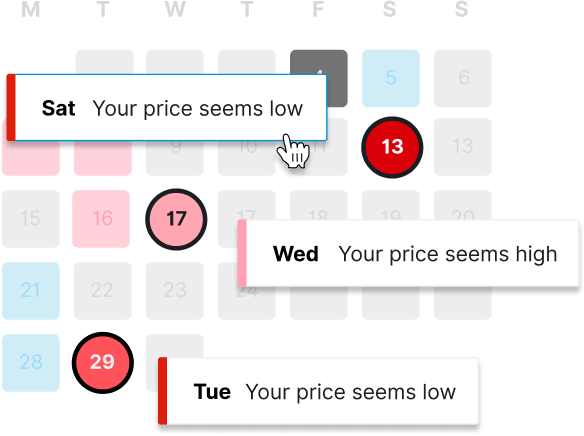
As a rule, pricing intelligence software is used on par with a channel manager – a tool that allows selling rooms on all connected booking sites simultaneously and keeping room availability updated. Through integration with the channel manager, pricing intelligence tools may adjust rates on various sites automatically.
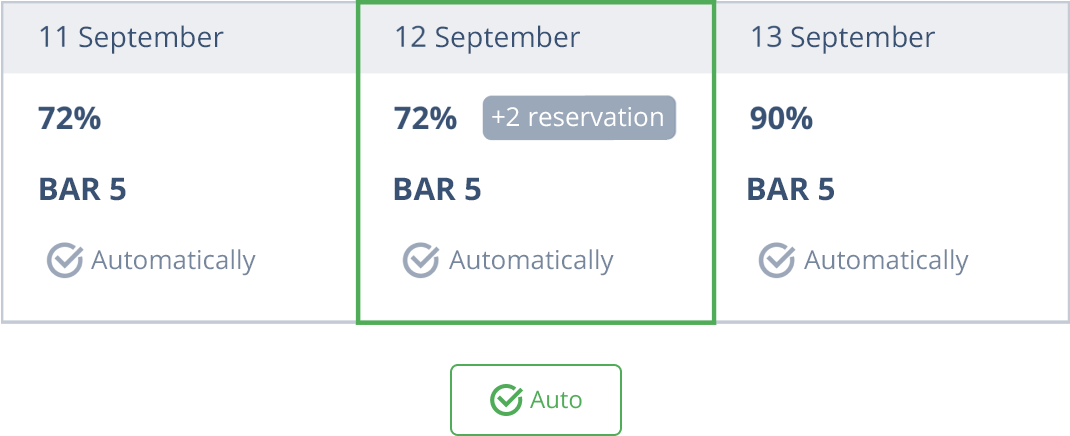
Parity intelligence with real-time data from the property’s distribution channels. It matches the place’s booking prices on different distribution channels and notifies users of undesirable pricing gaps. e.g. between their website and OTAs, or automatically adjusts the hotel’s rates.
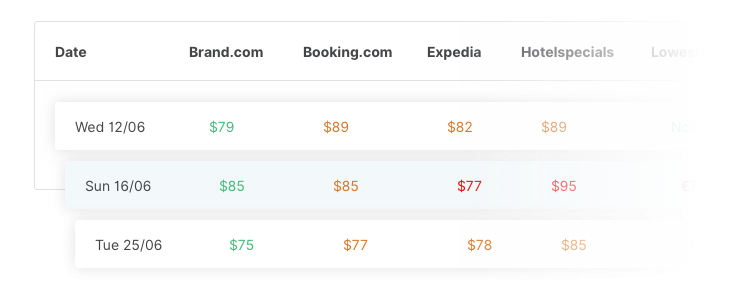
Demand analytics and forecasting with information about local occupancy rates, weather conditions, events and holidays, travel-related searches, and purchases, etc. It helps to estimate expected demand in the upcoming months and understand what rates to set and when.
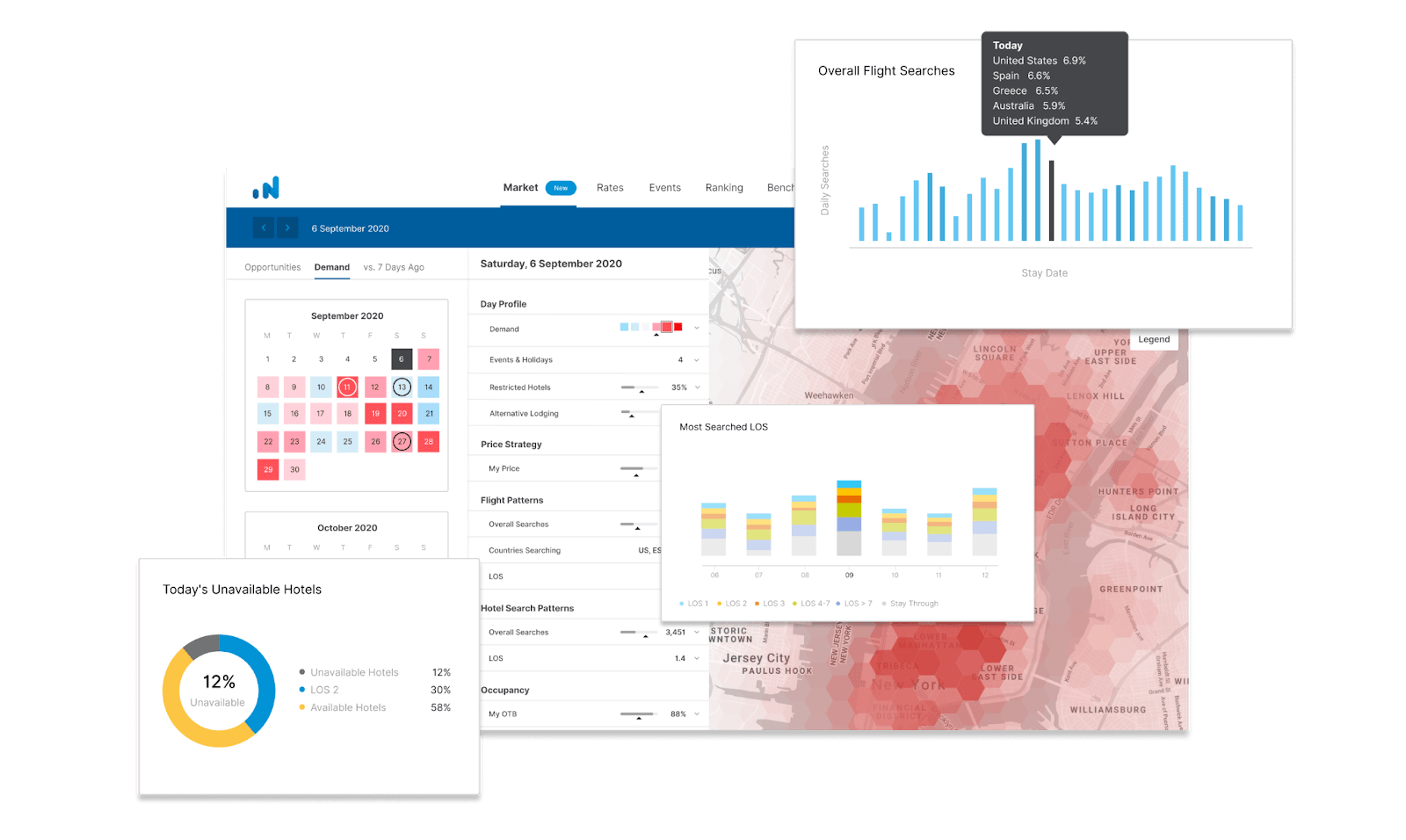
Overall, building such a solution would require the following:
- Collecting data on competitor rates and room availability from various channels specific to the parameters of stay
- Storing of historical data on users’ compsets
- Devising a system for price tracking and user alerting
- Integrating with major channel management tools
- Integrating parity data from the user’s channel manager
- Incorporating machine learning for hands-off rate adjustments and demand forecasting
- Gathering data on city-level industry demand, local events, holidays, weather, search trends related to city tourism, etc.
Using DataForSEO Google Hotels API to build a rate intelligence tool
Data analytics is a crucial process in many if not all industries and the hospitality sector is not an exception. Solutions that help to glean insights from large data sets accordingly depend on the quality and reliability of the data they provide to users.
Oftentimes, gathering data in-house takes too much time and resources, and still does not yield the desired results in terms of accuracy given the numerous challenges of the process. To begin with, building flawless logic and devising a proper data collection system requires great precision and expertise. Later on, system refinement and maintenance often rob companies off of money and valuable effort they could’ve invested into the development of customer-focused features to increase profits.
Knowing this perspective, many companies opt for commercial APIs (application programming interfaces) that supply data from vendors straight into their software. Reputable data providers ensure stability and accuracy of the data flow and allow businesses to concentrate on more critical aspects of their product functioning.
Here at DataForSEO, we are constantly working towards enlarging our offering to fit the needs of diverse industries and help more companies get a reliable supply of structured data without excessive work and spending.
Google Hotels API is one of the latest additions to our Business Data stack. We have designed this API with flexibility in mind and utility in action. It supports all Google’s selection parameters and can supply you with data in real-time or on a queue basis.
Hotel Searches endpoint provides a detailed overview of lodging options listed in the “immersive view” of Google Hotel Search. For this endpoint, you can specify:
- Keyword
- Location and language
- Check-in and check-out dates
- Currency
- Number of adults
- Number and age of children
- Hotel class (e.g., 5-start hotels only)
- Minimum rating
- Sorting
- Search for hotels with a free cancellation
- Search for vacation rentals instead of hotels
- Hotel amenities (e.g., free wifi, pool)
The results of your request to the Hotel Searches endpoint will contain a list of relevant lodgings with their:
- Hotel identifier
- Hotel class ranging between 1-5 stars
- GPS coordinates of the hotel’s location
- Hotel reviews and rating info
- Featured images of the hotel
- Hotel pricing info
The second endpoint – Hotel Info – provides structured data from “hotel placesheet” in JSON or HTML. It allows indicating:
- Keyword or hotel identifier
- Location and language
- Check-in and check-out dates
- Currency
- Number of adults
- Number and age of children
The results of an API call to the Hotel Info endpoint will serve you with a comprehensive overview of a hotel’s pricing, reputation, and other information specific to the parameters you have set, including:
- Hotel identifier
- Hotel class ranging between 1-5 stars
- Hotel address and phone number
- Hotel description and images
- Hotel check-in and check-out time
- The domain of the hotel
- Hotel amenities
- Location details
- Details on hotel reviews and rating
- Booking prices (ads and free booking links)
- Domains and URLs offering the booking link
- Images featured in the price offer
Incorporating all of this data into your solution, you will be able to offer hoteliers an advanced compset analysis tool with deep industry insights. If you’d like to enrich it with travel-related searches view and demand forecasting, you can additionally integrate:
Google Trends API. It supplies keyword popularity across a multitude of regions and areas and allows identifying rising or declining trends and search interests.
Google Ads Search Volume API. It provides data on the number of searches for a particular keyword and can serve as a good indicator of demand for specific services or products.
You can review the pricing for our APIs here >>
Below is an example of a dashboard built with the help of DataForSEO Google Trends and Google Ads Search Volume APIs.
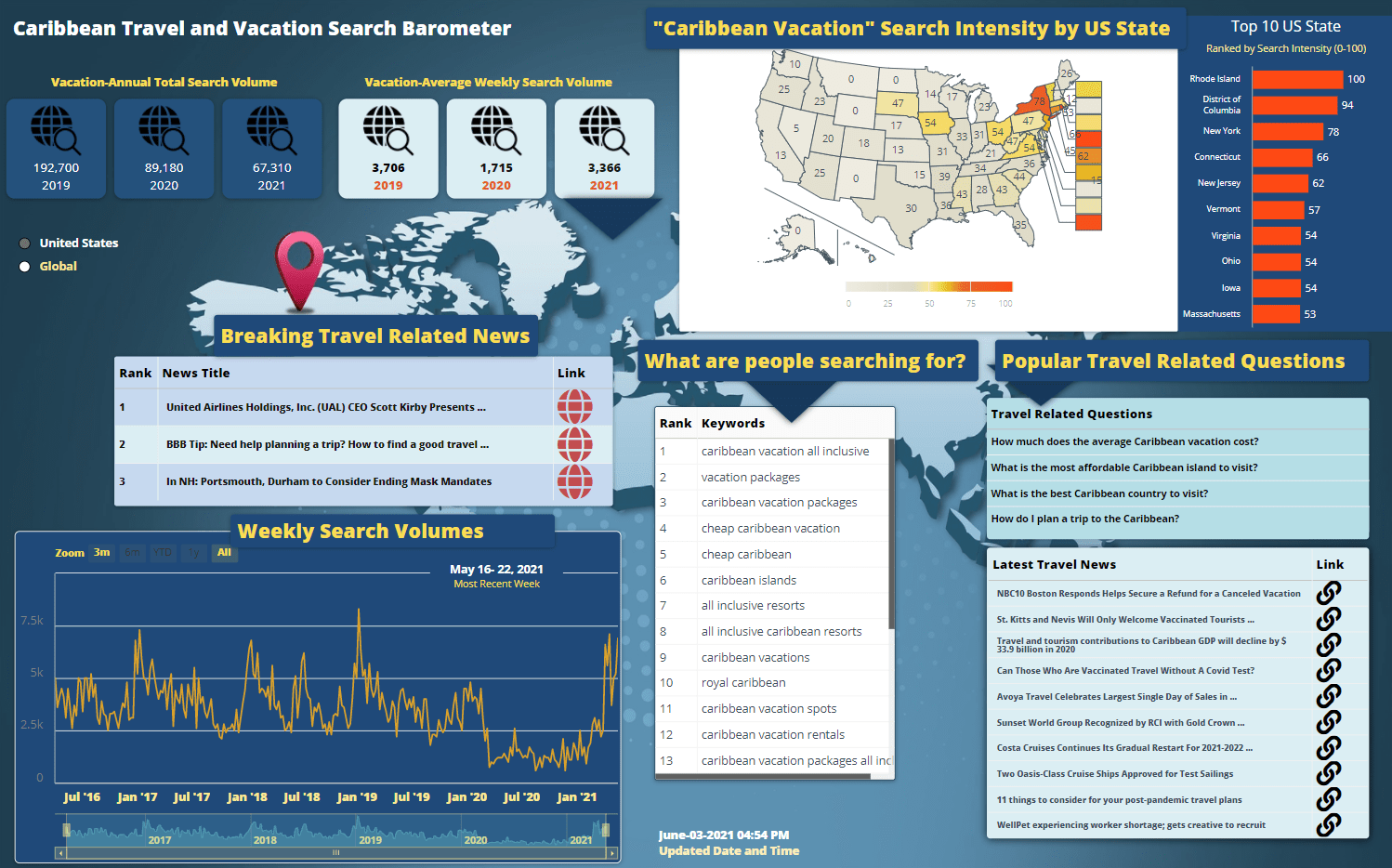
Summary
Dealing with competition is always tough, especially in such a crowded and dynamic market environment as the hotel business. Considering the multitude of distribution channels hoteliers usually make use of, software tailored to competitor rates tracking is an indispensable tool in their stack.
Google Hotel Search serves both as a great channel to reach potential customers and as a splendid source of business intel. Combining data on any hotel’s pricing from a variety of OTAs and metasearch engines in one place, Google Hotel Search can be leveraged when building compset analysis and price tracking tools.
Here at DataForSEO, we are ready to offer you a flexible API that supports all of Google’s selection parameters and supplies real-time data from the “immersive view” (Hotel Searches endpoint) and from “hotel placesheet” (Hotel Info endpoint).
Using the provided datasets, you can swiftly develop a tool that will track competitor rates and room availability from various channels and alert users when prices should be adjusted.
START FOR FREE

